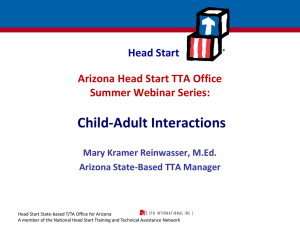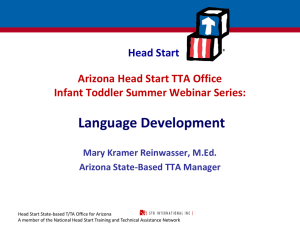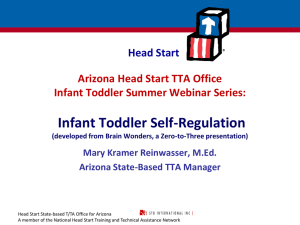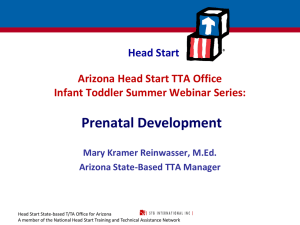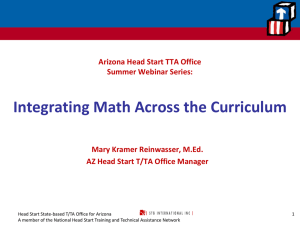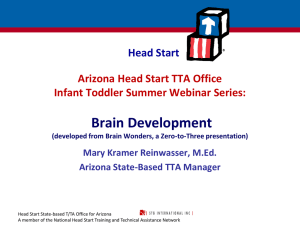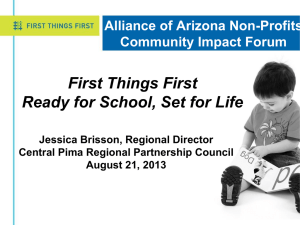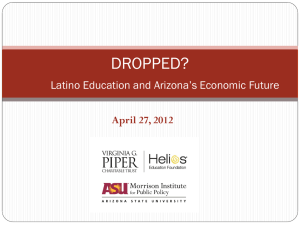Influences on Cognitive Development
advertisement
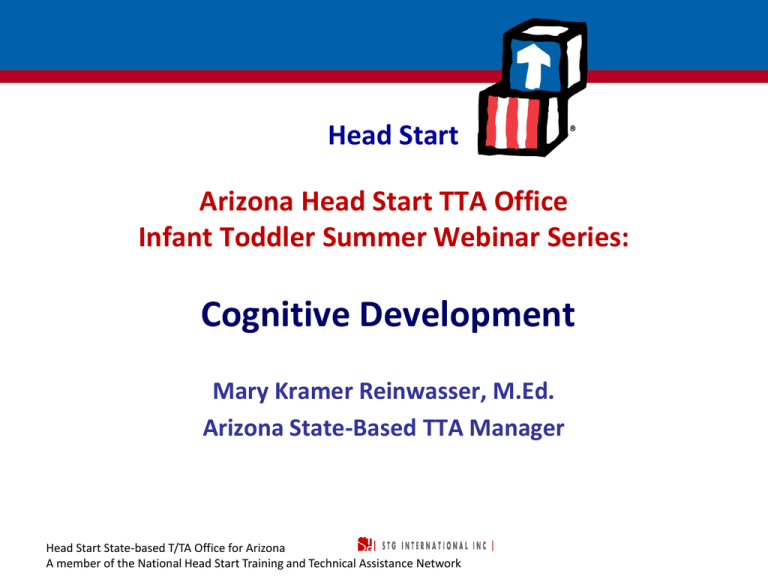
Head Start Arizona Head Start TTA Office Infant Toddler Summer Webinar Series: Cognitive Development Mary Kramer Reinwasser, M.Ed. Arizona State-Based TTA Manager Head Start State-based T/TA Office for Arizona A member of the National Head Start Training and Technical Assistance Network Agenda • Define cognition • Discuss theories as applied to infant and toddler development – Constructivism/Piaget – Social Cultural/Vygotsky – Information Processing • Role of the caregiver in cognitive development Head Start State-based T/TA Office for Arizona A member of the National Head Start Training and Technical Assistance Network 2 Learning Outcomes • Participants will be able to define cognitive development • Participants will be able to explain three theories that address cognitive development • Participants will be able to identify roles of caregivers in supporting cognitive development Head Start State-based T/TA Office for Arizona A member of the National Head Start Training and Technical Assistance Network 3 What is cognition? • The act of knowing • Gathering, categorizing, comparing, and organizing information • Involves mental processes of perception, memory, and learning • Involves non-mental processes of personality, emotions, and social conscience Head Start State-based T/TA Office for Arizona A member of the National Head Start Training and Technical Assistance Network 4 Piaget and Cognition • • • • • • Schema Adaptation Assimilation Accommodation Equilibrium Disequilibrium Head Start State-based T/TA Office for Arizona A member of the National Head Start Training and Technical Assistance Network 5 Sensorimotor Substages Head Start State-based T/TA Office for Arizona A member of the National Head Start Training and Technical Assistance Network 6 Vygotsky and Cognition • Basic Assumptions – – – – The role of society Thought and language The role of adults Practices and applications • Principles – – – – Children construct their own knowledge Development can not be separated from its social context Learning can lead from development Language plays a central role in mental development Head Start State-based T/TA Office for Arizona A member of the National Head Start Training and Technical Assistance Network 7 Information Processing Theory • Memory • Attention • Categorization Head Start State-based T/TA Office for Arizona A member of the National Head Start Training and Technical Assistance Network 8 Key Developmental Milestones Understanding Living Things • Infants and toddlers use motion to identify animate objects • By preschool years, naïve theories of biology include understanding of movement, growth, internal parts, and inheritance • Ideas of illness and healing also present Understanding People • Children use naïve psychology to predict how people will act • Even 1-year-olds have understanding of intentionality • Between ages 2 and 5, children develop a theory of mind Head Start State-based T/TA Office for Arizona A member of the National Head Start Training and Technical Assistance Network 9 Key Developmental Milestones (cont’d) Understanding Objects • Infants rapidly create reasonably accurate theories of some basic properties of objects • Infant’s theories are far from complete and physical properties can be understood at many different levels Head Start State-based T/TA Office for Arizona A member of the National Head Start Training and Technical Assistance Network 10 Principles for Caregivers 1. Children will provide different explanations of reality at different stages of cognitive development. 2. Cognitive development is facilitated by providing activities or situations that engage children and require adaptation (i.e., assimilation and accommodation). 3. Learning materials and activities should involve the appropriate level of motor or mental operations for a child of given age; avoid asking children to perform tasks that are beyond their current cognitive capabilities. 4. Use approaches that actively involve children and present challenges. Head Start State-based T/TA Office for Arizona A member of the National Head Start Training and Technical Assistance Network 11 Influences on Cognitive Development The quality of the care babies receive from their primary caregivers influences the babies ability to successfully or unsuccessfully: – attach to other human beings, – regulate their impulses, – learn how to communicate with others, and search for an intellectual understanding of the world into which they are born. Head Start State-based T/TA Office for Arizona A member of the National Head Start Training and Technical Assistance Network 12 Influences on Cognitive Development What is created during the first two years of life is a brain structure which influences children’s approach to learning including such critical factors as: – a child’s use of relationships in learning, – the confidence of a child to engage in the challenge of learning, – the ability of a child to persist while learning, – the eagerness to use adult models for learning. Head Start State-based T/TA Office for Arizona A member of the National Head Start Training and Technical Assistance Network 13 Summary • Children actively construct their knowledge • Social interaction is essential for cognitive development • Cognitive development involves relating new information to prior knowledge • Children often think in different ways at different ages Head Start State-based T/TA Office for Arizona A member of the National Head Start Training and Technical Assistance Network 14 Questions Head Start State-based T/TA Office for Arizona A member of the National Head Start Training and Technical Assistance Network 15 The Arizona Head Start Training and Technical Assistance Office and STG International thank you for joining our webinar today! Please continue to join the 2010 Summer Webinar Series occurring every Tuesday and Thursday during the months of June and July at 3:00 Pacific Daylight Time. Please contact Mary Kramer Reinwasser at mary.reinwasser@stginternational.com for more information. Head Start State-based T/TA Office for Arizona A member of the National Head Start Training and Technical Assistance Network 16

